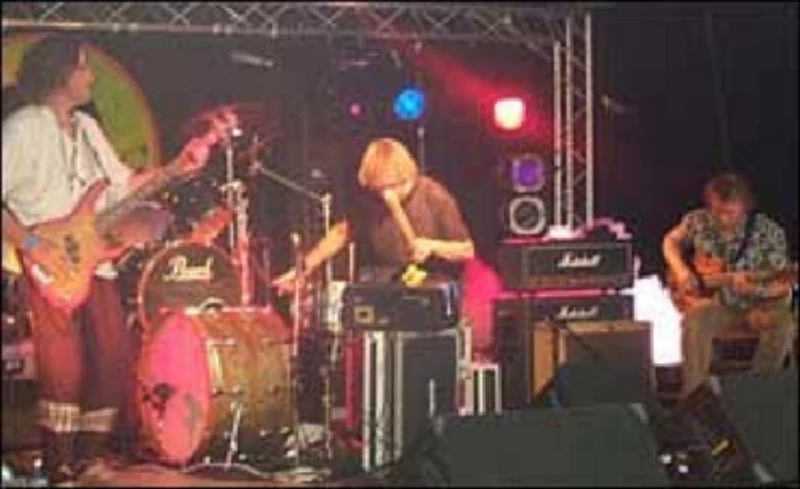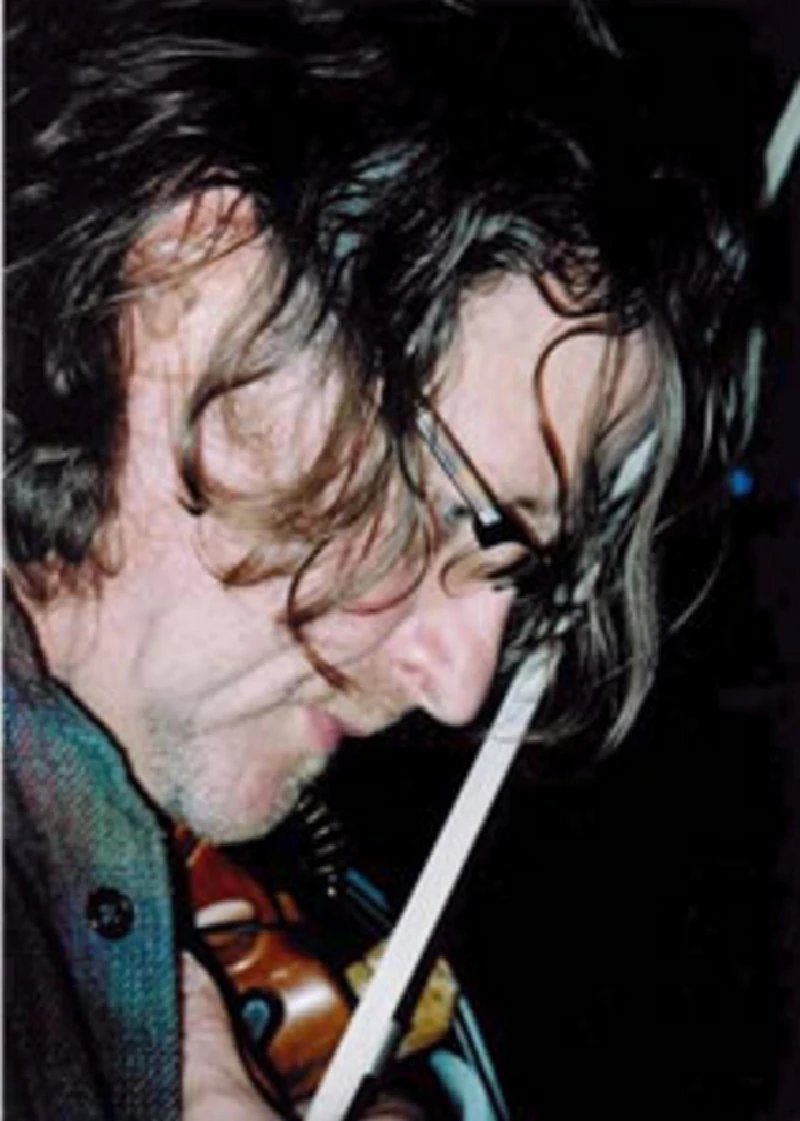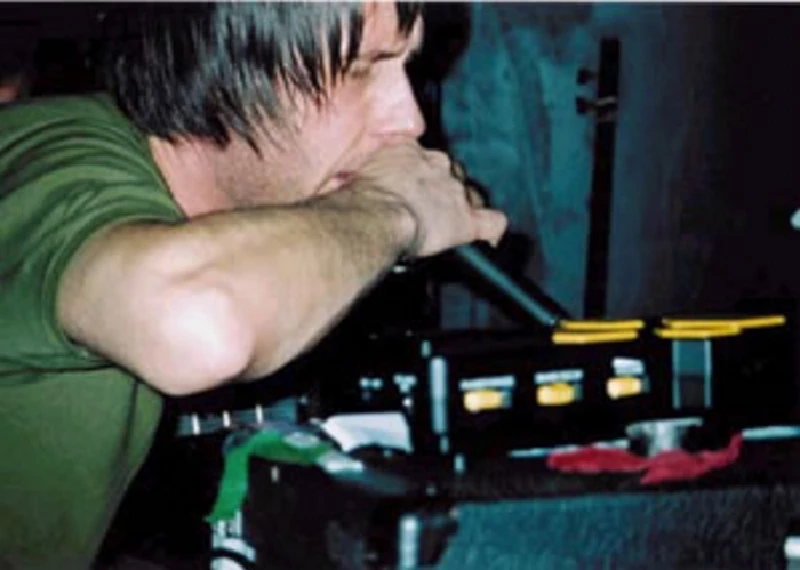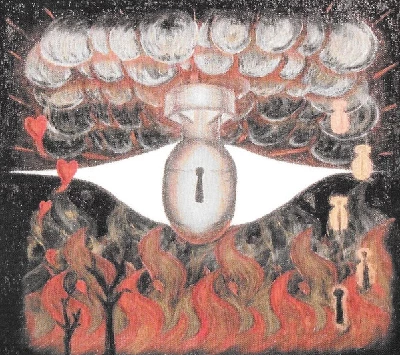Misterlee - Interview
by Helen Tipping
published: 17 / 5 / 2005

intro
Experimental Leicester band Misterlee recently self-released their second album 'Night of the Killer Longface'. Helen Tipping speaks to them about being part of the anti-folk movement and how they self-promote themselves
Misterlee are an experimental band from Leicester. The mainstay of the band is Lee Allatson, singer / songwriter and percussionist, with James Smith, guitar, and Michael Oxtoby, electric violin. The music isn't easy listening, but it's worth persevering with. Some of the songs are beautiful, like poetry set to music, whilst others are just downright scary. Live the music is different, due to their unusual way of playing which owes more to jazz sensibilities than rock, though they are by no means a jazz band. Lee plays the tracks to James and Michael once, and they then improvise around the original, with no gig ever sounding the same. Misterlee have released two albums on their own label Rubber Czech - 'Chiselgibbon' and 'Night of the Killer Longface'. You can also download or listen to their music on their website at http://www.misterlee.co.uk/misterlee/misterlee.html The band are currently touring to promote 'Night of the Killer Longface', and details of further gigs can be found on the website. The band have a DIY ethic, and are promoting the album themselves, with Lee busy arranging gigs with smaller venues around the country. They took some time out before their Sheffield gig at the Washington to speak to Pennyblackmusic, in what proved to be a humorous and enlightening interview. Apologies to the band if any quotes are attributed to the wrong band member, but hopefully the message remains the same - go out and try something a little different! PB: Your music is quite individual. With a lot of identikit bands around at the moment, how do you get heard? LA: On a basic level, it works because we are working independently, which means a lot of our work gets heard at a grass roots level. The end result is finding a way of connecting with the people who are going to respond to what you do. Whether that's getting them to listen to what we've recorded or getting them into live gigs it's getting that interface basically. The problem is the big chunk of the music industry that's basically set up as a barrier, and it makes that very, very difficult. That's the thing that I've found most difficult in terms of getting the album out there is getting it reviewed to a level where it can make a big difference to us. I think it's something that strangles the smaller media outlets as well - fanzines are on the wane to compared to what they were a few years back. PB: There's a lot of online info now… LA: Yeah, but, including webzines in that , it's hard to know from the responses we've had to reviews, just how much that affects things really. The industry itself has become more controlled by fewer people, so the media has as well. JS: Isn't it true as well that most people's first point of contact with the music that they buy is that they see it on the television or hear it on the radio? And it's try before you buy then - so their first point of contact with us is live or through our website. But it's very difficult to get people to engage with something through the written word because writing about music in itself, although it's something that we all do, is like writing about cooking. PB: Yes how do you tell people what a band sounds like ? You end up resorting to saying it sounds a bit like so and so and then you're putting people in a box. LA: It's difficult. A lot of it does come down to the listener though because people's listening attitudes have changed. There's no doubt about it. We were talking earlier about it, especially when you play London, that you sometimes do get the feeling that people don't really want to make decisions for themselves in a lot of ways. So they hide behind things - "oh it's not my thing or I don't understand it or I don't know what it is" instead of saying either I like it or I don't. It seems to be an attitude with a lot of people with art in general, and especially music nowadays. With the spoon feeding atmosphere of the media, marketing and selling music has become so adapted to getting music out there in the way that it is now that people just sit there and lap it up really. There seem to be less and less people that are willing to go out there and make decisions for themselves. PB: So if the NME likes you and promotes you, and you're their flavour of the moment people will go? LA: Mm, at the end of the day if people don't know who you are then you haven't got a hope and it does make it difficult. I do wonder though whether things will change because ultimately all these things are fashion trends. We had a fashion trend for independently produced music 20 years ago and hopefully that will come around again, but you almost have to reach a terminal situation where it's so bad. PB: Like when punk happened? LA: Yes it's almost reaching that point now I think where people will start looking out for those things that are just a little bit special to them, and wanting to find that little band or that album that's not like everything else, and that not everyone knows about. PB: Do you think we're getting back to that punk DIY ethic in music? LA: I think so yeah. There are a lot of artists who are working very hard at a grassroots level promoting themselves, touring very hard, and getting results for it. I think it can be the mother of invention in terms of the content of what people produce as well in that if you do come up against these walls and if you're of the mind to really tackle it then it does make you more inventive in what you do. PB: Do you prefer to promote yourselves and be working for yourselves rather than having PR people there to do it? LA: I think so, until a situation arises where someone is of the same mind as us and, while there isn't, there's no way I'm going to turn around and say well we should make a hit - it makes much more sense to make it a voyage of discovery to find out what we should do and how to do it - which means a few blind alleys now and then. PB: You were planning to play SXSW . Did you play there in the end? LA: We didn't in the end - we did plan to but in the end"Night of the Killer Longface' got released quite late and everything dragged over into March and April when SXSW was. PB: Is that a missed opportunity in terms of getting yourselves known over there? LA: Not really. We went to New York last year and did some shows over there, but SXSW is a very industry led festival and at the time when the festival happened we didn't have the album out, so maybe next year - it would be a nice thing to do. We like going on these ridiculous japes. JS: We're saving up for it , aren't we ? We did that for New York - I remember that night when you said "What do you want to do with the money from this gig (which wasn't much ?) Shall we split it or shall I put it towards the kitty for New York." We had a vote. PB: Are you planning on going over to Europe at all? LA: We're not, but we're saving again at the moment. We've talked to quite a few people who have played in Germany, and I know quite a few people that have done tours in Germany quite recently - again on a very indie basis. PB: I've heard that bands who are unsigned go down pretty well over there compared with here. LA: Yeah, especially if you're from New York or the States here anyone will put you on. We've had some strange situations where people have thought we were from New York and when they've found out we're not you can see a change of attitude. I think it's that exoticness that their after. PB: Are you going to do any festivals over the summer? LA: Again we've got quite a few smaller things - I've never thought of approaching anything like Glastonbury. I don't like big gigs to be honest. I've never been a fan of going to big gigs - I don't like it, it's like going to the supermarket and I think the festivals are a similar sort of thing. We've done some great small festivals. We did the Godiva Festival in Coventry last year, which was great . We had a really good night there. We did a little tiny independent festival near Lincoln last year as well where we had a fantastic response. A real sort of honest response and we could interface with people who were into what we're doing. There was a real honesty there. If you go to a bigger festival, there's always a kind of pretentious angle to it. I don't know. It's the underdog in me. PB: Can you tell me a bit about the anti-folk movement that you’re said to be involved in? LA: It's something we just fell into really. Obviously if you're creating original music, it's like what you were saying about describing music, you don't have any kind of thing that you fit in with. I think anti folk is a code word. It isn't actually anything but if people relate to what the word is, then it's like a code word or an ethos - a DIY sort of ethos and it's certainly not sound driven which is quite healthy really. By definition it's really a New York movement because it started out as singer songwriters that couldn't get gigs in a lot of the venues in New York because they were too challenging or too off the track and not mainstream enough. PB: I had kind of assumed it would be people that didn't like folk music, but it's not about that, is it ? LA: Not at all no. PB: Unless it's anti-American folk music. LA: It's a funny one that. It's definitely cosmopolitan in terms of politics - very world aware, but also quite pro-American. A lot of them cite as influences a lot of very old traditional artists, so it's not an anti-American thing at all, but quite anti-Bush. PB: Do you have any particular influences? LA: Not really, in terms of writing anyway I try to make it more of a voyage in the other direction really. I try to ostracise myself a little bit. I never buy records. I'm terrible at buying records. I've always seen it more as a journey to get to the heart of an idea really rather than being influenced by other people. PB: So how do you go about writing,. Does it come from the lyrics or do you start with the music and it goes from there? LA: It comes from different places really and I'm in the process of changing the way I'm probably going to work. Up until now it's been a case of writing lyrical ideas, just piecing things together from that, but I'm going to try and work sort of writing in the studio, recording ideas straight onto the desk - so trying to compose as I go. So in terms of influences, well when you play gigs with people you tend to incorporate more of their way of doing things - you can't sort of help that. Part of the thing I want to do with the next release is get away from recording it just on my own , which i did for the last two, and involve the others and see what happens. PB: The last album had a lo-fi approach. Is it tempting to go more hi-tec? LA: It's funny how that term works, because it actually takes a lot of work to get it to sound like that. There are parts of the album that are more complex, for want of a better word, but I don't know. Until we actually start working on the new material it's hard to know what way it's going to go at all. I've always been quite keen on just seeing what way it develops rather than trying to impress any kind of idea on to it. There are a lot of happy accidents on the last album, but that's the beauty of writing in that way, where you are more or less recording ideas as they come. It's quite interesting and it does make it sound more fresh and spontaneous. PB: Is it quite fast that way of working? LA: No I'm really slow. Music doesn't come very easy to me at all. I have to work very hard at it. It's a labour of love. It's a myth the idea that someone can sit down and write something in 20 minutes. MO: I always like the Paul Simon quote which is that great songs aren't written. They're re-written. The idea there is that you continually rework and rework. Even once it's recorded and finished it's not finished really, is it ? What you'll hear us play later tonight won't bear an awful lot of resemblance to what's on the record and another six months down the line it will probably keep changing. PB: It must be very hard to recreate what you do in the studio anyway... LA: Well see what you think. I'm always very keen to try with the band, because it's as far away from the rehearsing process as you can get. What we basically do is rework the songs and it's quite funny because the guys sometimes get a bit angry with me because I never play them anything. They didn't have copies of the album until it was released! But it's good, because otherwise you hear it over and over again, and then you just start repeating it. Generally people prefer the live renditions to the album, so that's great. PB: What do you think to that approach of it just being played to you once ? MO: I think it's a good idea, because I'm the sort of person who would hear a song, take it home and really hammer it, and it wouldn't have that sort of natural flow to it. Because what you're doing is playing something that someone else has written. One thing that I think comes out of all our shows is that it's 3 individuals playing together. Hopefully the audience feels that they're not playing something that someone else has written at all. The way that we work is far closer to the way that a jazz band works when they take a standard and they do a version of it. LA: We turned up at one place, and ended up playing it with acoustic guitar and violin, which is completely different again. And here we've turned up tonight and there's no PA, so it's always different. We fall into quite a strange bracket that doesn't really exist in this country at the moment. PB: Do you think it does exist anywhere? MO: It exists in countries where there aren't supermarkets and motorway service stations, and national television broadcasters, where people actually make decisions based on the merits of what they see in front of them rather than the limited choice that they are actually given by whoever is picking the flavour of the day. I think if we landed somewhere in the desert in Africa we'd be all right. LA: That's it then - off to the Congo. I'd be up for it! Three seats, for the Congo, with extra leg room. They'd go mad for it. PB : Thank you.
Picture Gallery:-


live reviews |
|
Washington, Sheffield, 14/4/2005 |

|
| Despite a sparse audience at new and under-promoted venue the Sheffield Washington, Helen Tipping watches Misterlee, "one of the UK's more unusual band, rise to the occasion and put on an empassioned performance |
reviews |
|
This Disquiet Dog (2010) |

|
| Oddball, but effective and gripping third album from Leicester-based experimental act, Misterlee |
| Bootlegger (This is Not a Lifestyle Sandwich) (2007) |
| Night Of The Killer Longface (2005) |
most viewed articles
current edition
Carl Ewens - David Bowie 1964 to 1982 On Track: Every Album, Every SongBillie Eilish - O2 Arena, London, 10/7/2025
Bathers - Photoscapes 2
Bathers - Photoscapes 1
Cleo Laine - 1927-2025
Hothouse Flowers - Photoscapes
John McKay - Interview
Editorial - July 2025
Simian Life - Interview
the black watch - Interview
previous editions
Heavenly - P.U.N.K. Girl EPTrudie Myerscough-Harris - Interview
Pixies - Ten Songs That Made Me Love...
Boomtown Rats - Ten Songs That Made Me Love....
Fall - Hex Enduction Hour
Peter Paul and Mary - Interview with Peter Yarrow
Sam Brown - Interview Part 2
And Also The Trees - Eventim Apollo, London, 21/12/2014.
Doris Brendel - Interview
Place to Bury Strangers - Interview
most viewed reviews
current edition
Sick Man of Europe - The Sick Man of EuropeAmy Macdonald - Is This What You've Been Waiting For?
Phew, Erika Kobayashi,, Dieter Moebius - Radium Girls
Alice Cooper - The Revenge of Alice Cooper
Blueboy - 2
Lucy Spraggan - Other Sides of the Moon
Cynthia Erivo - I Forgive You
Bush - I Beat Loneliness
Davey Woodward - Mumbo in the Jumbo
Philip Jeays - Victoria
Pennyblackmusic Regular Contributors
Adrian Janes
Amanda J. Window
Andrew Twambley
Anthony Dhanendran
Benjamin Howarth
Cila Warncke
Daniel Cressey
Darren Aston
Dastardly
Dave Goodwin
Denzil Watson
Dominic B. Simpson
Eoghan Lyng
Fiona Hutchings
Harry Sherriff
Helen Tipping
Jamie Rowland
John Clarkson
Julie Cruickshank
Kimberly Bright
Lisa Torem
Maarten Schiethart